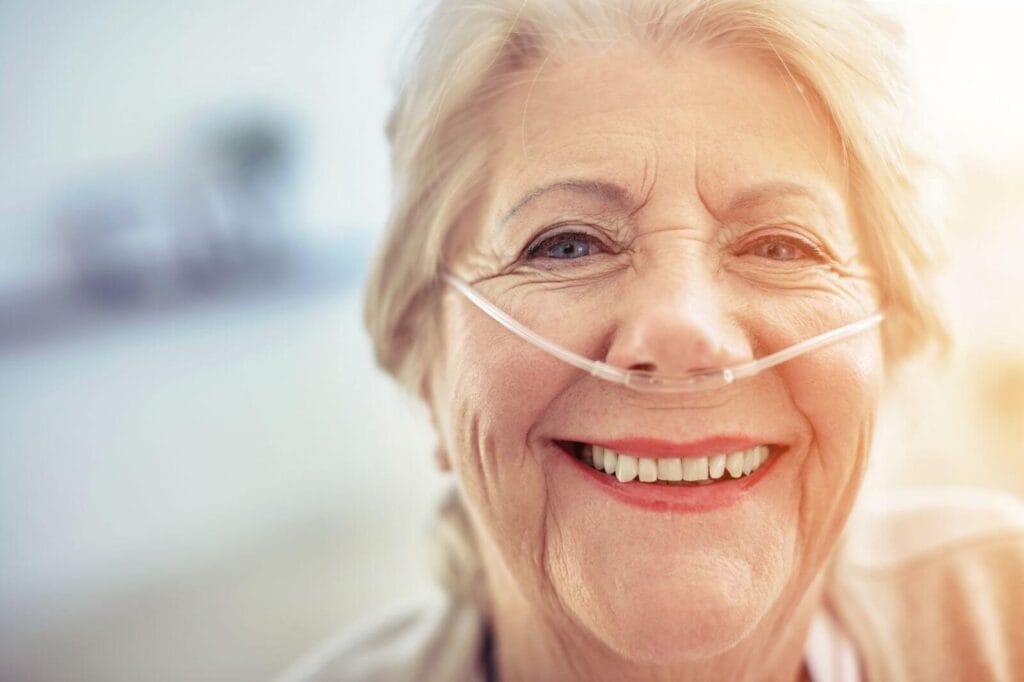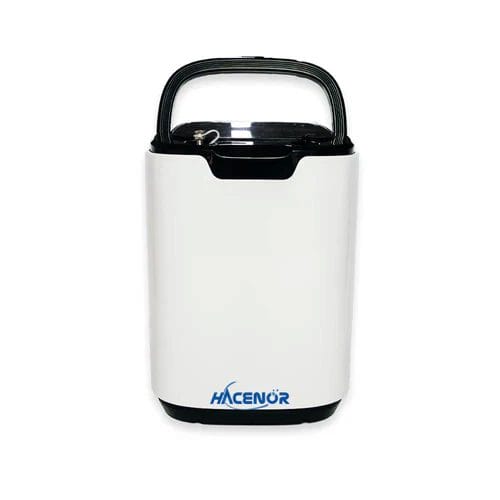
Some seniors have illnesses or diseases that require long-term oxygen use, like COPD or emphysema. Oxygen concentrators are one of multiple devices used to deliver supplemental oxygen therapy. By using oxygen concentrators for their oxygen needs, seniors can experience physical, mental, and social health benefits that improve their quality of life. This article will explain the basics of oxygen concentrators and go over the many health benefits of using one.
What are oxygen concentrators, and how do they work?
Oxygen concentrators are machines that pull in air from around you and filter out the other gases to deliver more concentrated oxygen. The air flows from the concentrator and into your nose or mouth through tubing. It may run continuously or in bursts.
There are two types of machines: stationary (or home) concentrators and portable oxygen concentrators (POCs). The home models plug into electrical outlets and have wheels to move them from room to room with you. POCs are battery-powered and carried around, typically by a shoulder strap or in a carrying case or backpack.
Oxygen concentrators are classified as durable medical equipment (DME) and can only be purchased from a medical supply company with a doctor’s order.
Health benefits of using oxygen concentrators
Oxygen therapy has many health benefits and can help reduce health risks when medically necessary. Supplemental oxygen is a medical treatment your doctor may use to support your breathing by increasing the amount of oxygen in the blood delivered to your vital organs. One goal of oxygen therapy is to improve or maintain your health and quality of life and allow you to continue to do the activities you enjoy.
Seniors can experience some or all of the following life-improving benefits while using an oxygen concentrator:
Less breathlessness during activities
Older adults with respiratory conditions may become winded during physical activity. When older people feel short of breath throughout the day, it can be debilitating and negatively impact their lives by preventing them from caring for themselves and completing daily household tasks. Also, people who are chronically underoxygenated (called hypoxia) often decline in health more quickly.
Using supplemental oxygen may help you feel less breathless when exerting yourself. The more oxygen-rich your blood is, the more oxygen is delivered to all your working organs and muscles, including your lungs. Improving the feeling of being winded can help with daily activities and general physical functioning.
Improved energy
Fatigue in older adults can result from breathing conditions. Respiratory conditions can lower the amount of oxygen in an individual’s blood, which can cause low energy levels. This fatigue can have compounding negative effects in keeping older adults from caring for themselves, maintaining a healthy physical activity level, and participating in social activities. Older adults in particular may require full-time oxygen use with a home oxygen concentrator for more energy.
Older people need to maintain their energy levels to remain active and get exercise, which can help them preserve muscle mass, have fewer sleep disturbances, and reduce their risk of chronic diseases. Seniors with conditions that reduce their blood oxygen-carrying capacity can improve their energy levels by using an oxygen concentrator. When the body has more oxygen, energy improves, and fatigue decreases, allowing seniors to stay active and take care of themselves better.
Better sleep
Older adults tend to have reduced breathing stability when asleep. One common cause is sleep apnea, which occurs when a person periodically pauses breathing during sleep. The brain receives reduced oxygen during breathing pauses, which results in less restorative sleep due to continually waking up to take breaths.
Certain lung diseases may also require oxygen support while you are asleep. If you have a sleep disorder or lung disease, your doctor may recommend using an oxygen concentrator at night to reduce sleep disruption.
Using an oxygen concentrator can ensure you get enough oxygen while sleeping. Sufficient oxygen is necessary for deep, restorative sleep, which in turn helps improve memory, concentration, mood, and immune function and regulates stress and anxiety. Feeling rested can also lead to improved energy levels during the day.
Ability to be more active
Due to limited oxygen intake caused by certain diseases or disorders, older adults may experience a decline in physical activity. Low energy levels, breathlessness, and poor sleep quality, which commonly result from respiratory conditions, may keep them from being as active as they’d like.
Portable oxygen concentrators (POCs) allow people to live more active lifestyles by providing them with supplemental oxygen outside the home or during physical activity. Seniors can easily carry the lightweight machines into the community and while traveling. Using POCs to keep your breathing more comfortable may allow you to get out of the house and exercise, which has the added benefit of increasing muscle tone and improving coordination, an important part of fall prevention.
Improved social relationships
Older people can become isolated, especially if they have medical conditions that make it difficult to leave the house. They are at a higher risk for depression and cognitive decline when they are secluded from family and friends, so it is vital to maintain social relationships. Strong social support can also help build resilience.
With low energy caused by breathing disorders, seniors may find it challenging to get out of the house. Even if they use supplemental oxygen, they may feel like they must always stay home with a home oxygen concentrator. However, a portable oxygen concentrator might be a solution. Going out with a portable oxygen concentrator can help you maintain your social and community connections. These devices are small, lightweight, and designed for travel. Having a backup battery or charging it can help you stay away from home longer.
Being able to leave the home for extended periods while receiving the oxygen necessary for their health can help older adults to more frequently connect with loved ones. Maintaining a healthy social life can also benefit their mental and cognitive health.
Oxygen concentrators can improve your health and quality of life
Oxygen concentrators are designed to give your body the oxygen it needs to function properly. If your body is getting sufficient oxygen that it otherwise might not receive due to health issues, you will feel better, sleep better, have more energy, and be able to stay active and socialize with loved ones. The many benefits of oxygen concentrators have a cascading effect, with each benefit feeding into another. These benefits can significantly improve the health and quality of life of individuals with a medical need for oxygen therapy.








